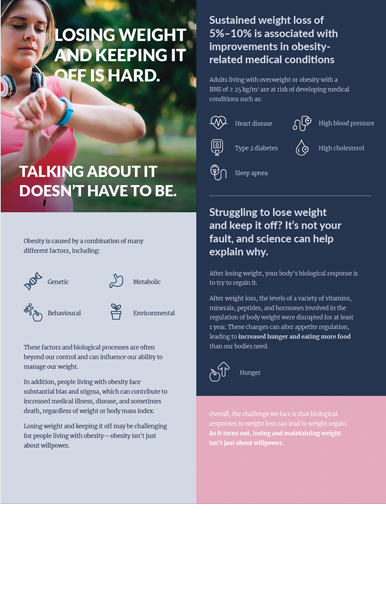For those patients who meet the criteria for obesity or overweight, multicomponent psychological interventions which include behavioural modifications, cognitive therapy, and values-based strategies can be an effective part of weight management. Empathetic and supportive counselling can help patients to address the challenges of weight management.1,2
Click on the sections below to explore talking points and resources to help shape your discussions with your patients.
ASK: for permission to discuss weight and explore readiness for change
ASSESS: obesity class and stage and for drivers, complications, and barriers
ADVISE: on obesity risks, on benefits of weight loss, on the need for long-term strategy, and treatment options
AGREE: on realistic expectations, to focus on behavioural goals (SMART), and on a treatment plan
ASSIST: to address drivers and barriers, to provide education and resources, in referring your patient to the appropriate provider, and in arranging a follow-up

The complex and sensitive nature of obesity can make it difficult to discuss with patients. Taking an empathetic approach, and obtaining the patient’s permission and buy in throughout the conversation can be effective.3 Research has shown that when healthcare professionals employed such an approach, patients were more likely to implement lifestyle modifications for weight loss. It is important to first ask patients for permission to begin the conversation about excess weight.

Download
An obesity-centred history discussion is intended to complement a full clinical and physical assessment to identify metabolic, mechanical, mental health, or monetary factors, as well as medications, that may be the reasons for weight gain.2 A successful weight history discussion can result in:
Assessment of root causes that influence eating and activity behaviours13
Understanding of past efforts, challenges and successes with their weight management journey13
A basis for individual behavioural goal setting2
Main components and goals of a weight history discussion
The following talking points and questions may be helpful to achieve a successful weight history discussion:
Changes in weight over time
Each patient will have gained weight differently. Understanding how and why their weight has changed can provide insight into their weight gain triggers.13
Factors in weight changes
This discussion involves eliciting your patient's perceptions of causes as well as connecting any past medical causes to changes in weight.13
Descriptions of past weight loss efforts
Discuss and understand your patient's past efforts with weight loss, including specific programs or plans, duration, and results.13
Current habits
A discussion about your patient's current eating and activity habits and how they might feel about changing their current habits.14
A discussion about goal setting is a way to help your patients connect their goals with the behavioural changes they can make for better weight management. Align with your patients on realistic and individualized goals as a first step towards creating sustainable long-term changes in behaviour.1,3 Try setting goals that are connected to your patients’ values and objectives. For example, connect the goal of engaging in more physical activity to activities they can do with their children or family, such as going for a walk once a day.
It can be helpful to refer to the responses for the talking points and questions above, about how weight may affect your patients’ medical, physical, emotional, and day-to-day well-being, and their lifestyle goals and plans.3
There are several things you can do, such as working with your patients to help them set lifestyle goals. To begin the process, here are some questions to consider asking:
What do you want to strive towards? If you think about the big picture of your life, what do you want it to look like? Health? Travel?
Do you have any general goals for overall well-being or how you want to feel better physically, emotionally and medically?
Do you have a certain amount of weight that you want to lose?
Considering your lifestyle goals, we can work together to take the first steps towards what is realistic for you to manage your weight and health
When discussing treatment for weight management with your patients, incorporating medical nutrition therapy and physical activity should be included along with other options available, such as medication and/or surgery.2 Patients who have struggled with excess weight may take some time to adopt new healthy habits. As you approach the topic of healthy eating and physical activity with your patients, focus on achievable steps that patients can take toward sustainable lifestyle changes.
Patients could also keep a food and physical activity journal to
help them stay on track with these behavioural changes. They can
record things like:
Food and drinks consumed
Hunger levels before and after eating
Time spent being active and what types of activity
Overall feelings about the lifestyle changes they are making
By recording the situations and feelings in which people living with obesity make decisions about food, you and your patients may be able to identify areas for change. Patients can bring their journal to each appointment to discuss general patterns. Healthcare professionals are encouraged to provide positive feedback and celebrate any progress made with the patient’s lifestyle changes.
Research indicates that patients with excess weight feel stigmatized in many areas of their life, including healthcare settings.3,16 The language you use and your environment are two key components to successful weight management. To promote successful interactions with your patients, it is important to consider the following:3,17